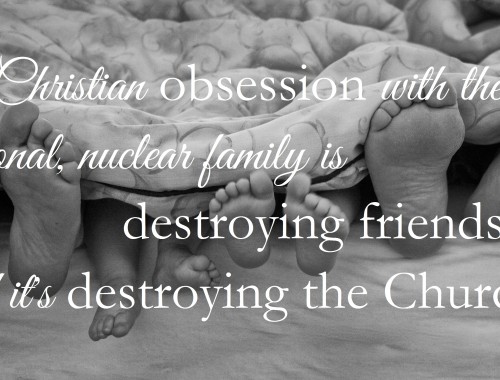[This is part two in a series. You can read part one here.]
Like most teenage girls, I did a smattering of baby sitting. There were only a few families in our fundamentalist church-cult who had young children, and most of the babysitting opportunities went to the pastor’s daughters, but I did, occasionally get my chance. One of the ladies that I baby sat for with any frequency was Laura*. Most of the time, with other families, I baby sat for “date night,” but when I baby sat for Laura it was often in the middle of the day. She would call and ask if I could come over, and then she would go out. Sometimes, she would work on getting house work done while I watched the kids. Other times, she would go into her bedroom and shut the door for a few hours.
She never asked the pastor’s daughters to baby sit. I didn’t really understand why, but I loved her kids so I never asked.
One afternoon she was visiting with my mom while I entertained the kids in the living room, and I overheard snatches of their conversation. It was the first time I’d ever heard the term bi-polar, and I had no idea what it meant. From context, I understood it to be some sort of mental . . . thing. I didn’t have the vocabulary to talk about things like disability or illness. She had gone to the leader of our cult about her struggles, and he had told her to go off her medication. I remember that she started to cry at this point, telling my mom that she had gone off her medication, but it had made everything so much harder. She didn’t know how to cope, and she wanted to go back on her meds– she asked my mom what she should do. She was confused, distraught– she wanted to do the “right thing,” but she didn’t really think that her bi-polar disorder was sin in her life she hadn’t dealt with. She’d been divorced and re-married– was God punishing her for that?
My mom has never been one for giving advice– she listens, and tries to empower people to make their own decisions. It’s one of the most beautiful things about my mother, that she never gave in to the culture of elder women “teaching” the younger– in reality, giving younger women a legalistic, formulaic list. She listened to Laura, and eventually Laura decided to go back on her meds– for her own sanity.
Laura did go back on her meds. Somehow, the leader of our cult found out about it, and within a matter of weeks Laura and her family were gone.
~~~~~~~~~~~~~~~~~~~~~
My junior year in college I took a class called Educational Psychology– which, I found out later, was only called that so that students who graduated with an education degree could try to get a teaching license. In reality, the focus of the class was only on summarizing the history of educational psychology and giving hundreds of reasons why all the teaching methods based on psychology were hideously, perniciously wrong. Their answer to “psychology in the classroom” was just to mete out more punishments. The only project I had to do for the class was write a paper explaining my “philosophy of classroom discipline.”
The main textbook for the class was, unsurprisingly, Why Christians Can’t Trust Psychology. I read it, and to my shame swallowed it hook, line, and sinker. At this point in my life, my mother had decided to seek counseling for depression. They had just moved across the country, and she was still deeply struggling with the ramifications of being viciously attacked in our church-cult for years. She told me this right after I’d finished reading this book, and in a fit of anxiety I told her to make sure she found a biblical counselor, and not to go to someone with a secular degree. They couldn’t help you– they’ll only make the problem worse.
The book’s jacket description is fairly vague, offering a bunch of different questions that are representative of various viewpoints. But, here’s some of the positive reviews from goodreads:
A must read for ANY Christian. It truly explains how psychology has NO business in the church or the lives of Christians and confirms completely that God’s Word alone is sufficient to help us with all of our supposed “mental health” issues. Sin needs to be called sins, not diseases.
I just love that mental health is in quotation marks.
I had to read this book for the first Biblical Counseling class I took, and it really influenced the way I looked at psychology. I had always sort of distrusted much of psychology, but this book opened my eyes to specific ways in which it is unbiblical. It also pointed out areas where it has crept into the church, to our great detriment.
From anecdotal experience and what I’ve been told, this book shows up in a lot of counseling/psychology classes at evangelical colleges, even ones that are more “liberal” than the fundamentalist college I attended. Here’s another review from amazon:
This is an eye-opener. Dr. Ed Bulkley has written a book that should be read and taught in every ministry training school, or church. As a devoted student of God’s word, I have always approached secular psychology with an air caution. Now, I have greater reason and sound documentation to remain cautious.
The overarching theme of the book that is painstakingly clear is that “psychology is unbiblical and dangerous,” and from the fact that most of the reviews were positive, most readers seem to think that this opinion is just fine and dandy. Most of the reviews reflect one simple principle:
The Bible is all we need for life.
This perspective actually has a name: solo scriptura. This theological position is different from the typical Protestant orthodox view of sola scriptura. Solo scriptura is very, very common among fundamentalists. They reject the regula fidei, they reject any notion of the creeds. They have no need to pay attention to the church fathers, or even modern, respected theologians and apologeticists. If they even acknowledge the existence of men like Clement, Augustine, Calvin, Luther, Wesley, Lewis, or Schaeffer, they are as passing references and treated with an extreme amount of suspicion– especially the early church fathers, who are perceived as being “Catholic.” Reason and emotion are swept aside– the only thing the matters is the Bible.
This results in a complete dismissal of the validity of things like mental illness, mental disorders, and depression. These things become nothing more than “sin problems.” Much like Job’s friends, fundamentalists view any sort of mental problem as being strictly a matter of the person not being “right with God.” You’re not really struggling with depression– you’re just bitter. You aren’t ADD– you just weren’t spanked enough as a child. You’re not bi-polar, you lack temperance and are prideful. You just need to get over yourself and learn some self-control. Or, among hardcore fundamentalists, sometimes mental illness (especially schizophrenia) isn’t a matter of sin– you’re demon possessed. Most commonly, you’ve let Satan build a “stronghold” in your life.
I believed all of these things. I pontificated about how ADD and ADHD are over-diagnosed and these kids are just a bunch of stubborn, willful, spoiled rotten brats. I believed that depression was simply a lack of self-control, and if those pansies just sucked it up and dealt with their bad feelings like a grown-up, no one would have a problem. I dismissed things like “chemical imbalances” wholesale. Rolled my eyes at PTSD. Scorned medication as merely a patch on a deeper soul problem.
While I was in the grip of these beliefs, I could not see anything in my life clearly. I struggled with mild panic attacks and depression– but they only confused me. I had no idea what was happening– nausea could stay on me for days, and I lost 30 pounds over the course of a few months. My heart would start to feel like it was about to explode, and even though it frightened me, I had no resources to understand it. All I ever wanted to do was sleep, and it took mountains of effort to even communicate with someone. Just a few words could be exhausting, at times. I felt sick, tired, and achy every single day. I was only suicidal once, but I very dangerously dismissed those thoughts as insignificant. A friend who knew better than me asked me to give her all of my prescription pain relievers– and I did, but I felt silly and idiotic for doing it.
But, I had no idea that these are textbook symptoms of depression. And because I had been robbed of the ability to identify these things, I couldn’t even see that I had a problem. This was just life now.


